Tempus Takes Manhattan: Janet and Chris Morris’ Tempus Unbound
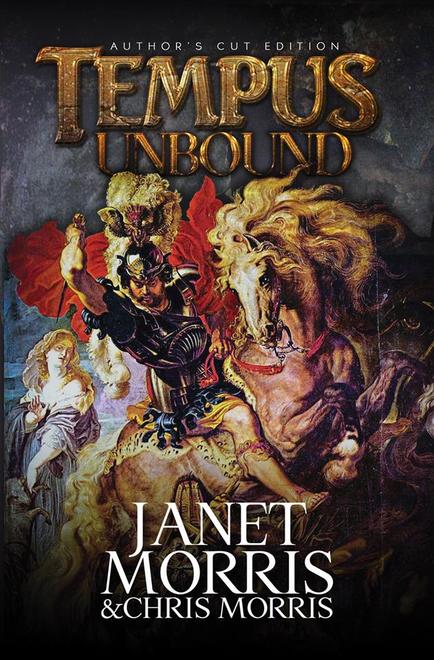 |
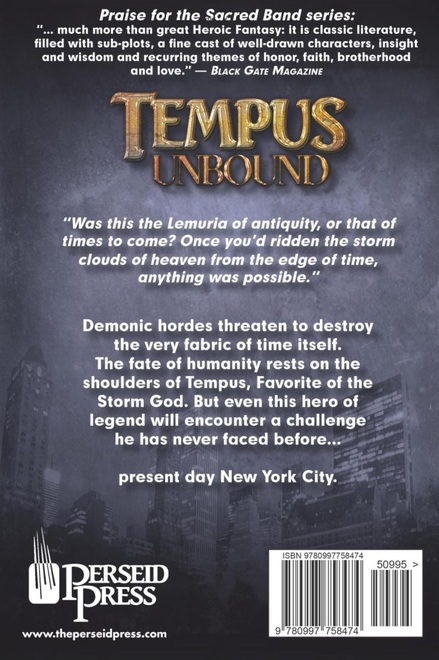 |
“Was this the Lemuria of antiquity, or that of times to come? Once you’d ridden the storm clouds of heaven from the edge of time, anything was possible.”
Few are the writers who can successfully take their characters out of their “ancient setting” and transplant them in a story set in modern and even futuristic times, fighting numinous enemies, inimical foes and a capricious and dangerous theomachy. In my opinion, Janet and Chris Morris have brilliantly achieved just that with Tempus Unbound. This novel takes place after the events in City on the Edge of Time, and before those of Storm Seed, and it’s quite a departure from the other novels in starring Tempus the Black, Niko, Strat and the other warriors of The Sacred Band. It’s also quite a wild ride — an adventure that never lets you pause for breath.
The story begins after Tempus leaves the City at the Edge of Time and heads for Lemuria. But is this the Lemuria before or after the Fall of Man? Is it the Past or is it the Future? As events later play out in the novel, we find that out. Tempus is on a quest to find Cime, the Mage Killer who may or may not be his sister, who was forced into a marriage to Askelon, the Lord of Dreams. Cime has gone missing from Meridian, Askelon’s dream realm, and Tempus rides to Lemuria looking to find her. He suspects she’s gone after some mage who needs killing, and hopes she has her magical diamond rods with her, for without them she’s powerless.
[Click the images for bigger versions]
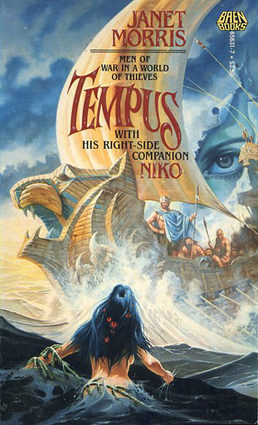 |
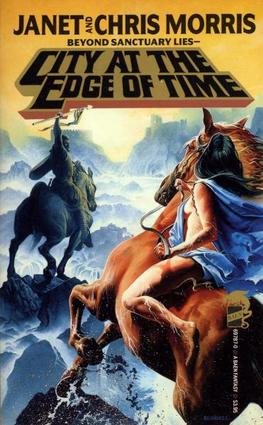 |
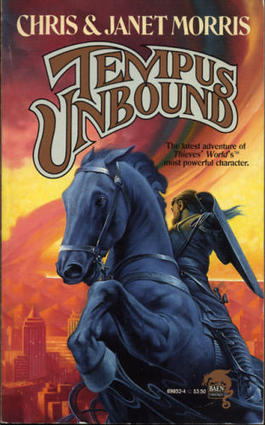 |
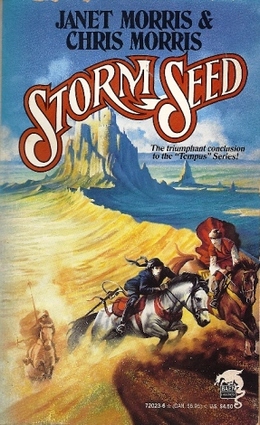 |
Original Baen paperback editions, 1987 – 1990
When he arrives at a mystical place called Pinnacle House, Tempus is invited to a dinner party hosted by Chiara, the Evening Star of Lemuria. Among the handful of guests, which includes Askelon, are two warriors named Mano, a warrior from the future, and Rath, a New York beat cop. They’ve come to Lemuria seeking technology to save both the Present and the Future; like them, every guest at this feast is from a different era of earth’s history and all are battling magical and supernatural forces. The enemy they face is using weapons that could change and destroy the fabric of Space and Time, as well as other dimensional realms.
Tempus teams up with Mano and Rath, and the trio soon find themselves in present-day New York City, as well as the New York of the 22nd century. Rath wants to arrest a cult of murderers plaguing New York — a band of sorcerers that Tempus and Mano seek to destroy. Along the way they encounter a young man named Jerry, a role-playing gamer who calls himself Stinger. At first, Jerry thinks it’s all a game and gladly agrees to help Tempus, but he soon finds out that this role-playing game is no game at all. Nevertheless, Jerry sticks with the warriors and helps them locate Cime, who is a prisoner of a mage named Allegro, the deadly opponent Cime had targeted for death. Once Cime is freed and the battle is joined, Tempus and his new band of warriors set out to destroy Allegro and his demonic minions.
Tempus Unbound is an engaging and intelligent novel, well-thought out and well executed. There’s plenty of action and drama, and even some philosophical debate on the nature of good and evil, and man’s place in the universe. The story is not without a sense of humor, either, such as Tempus dealing with modern-day clothing, automobiles he calls “demon cars,” technology, and the slums, thugs and gangs of New York. He truly is a stranger in a strange time and place, but he learns to quickly adapt.
One of the things I enjoyed about this novel is that while it’s epic in scope and concept, it’s also a very intimate story. The plot of Tempus Unbound is not as complex as The Sacred Band or the Beyond Sanctuary Trilogy. This story is a quest, a straight-forward adventure tale, and unlike the other books featuring the Sacred Band, Tempus is “on stage” throughout the entire story. While it’s not written in the first person, it reads like it, for we get inside Tempus’ head and heart, because the novel is told from his perspective, his point of view. While Niko, Crit, Strat and the other members of the Sacred Band aren’t in this novel, Askelon does play a small part, and Abarsis the Slaughter Priest makes an appearance in a very well-written and touching chapter. Plus, Cime figures more prominently in this novel and we get to know so much more about her. We also see another side of Tempus; he’s more human, more accessible and less of an enigma than in other novels. This is his story, all the way, and it’s Cime’s story as well, for their love-hate relationship is finally resolved and we see both of them in a whole new light.
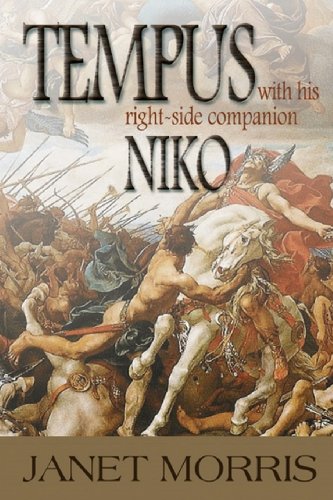 |
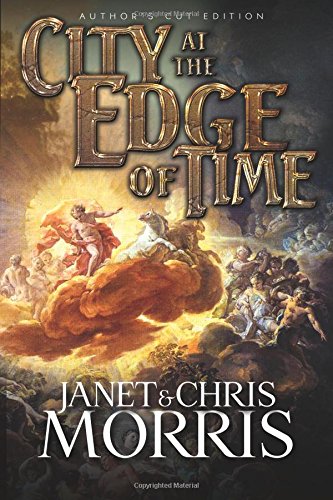 |
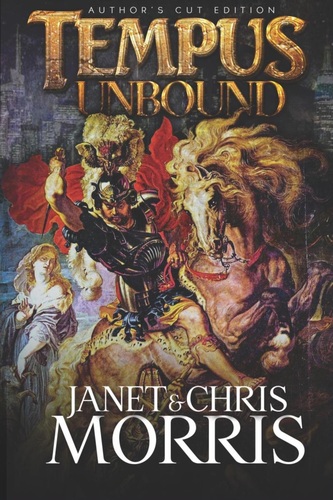 |
Perseid Press revised editions, 2013 – 2017
As in all the Sacred Band novels and stories, Janet’s and Chris’ prose is tight, crisp, clean and sharp. There’s no stilted dialog and they strike a perfect balance between subtext and being “on the nose,” as they say in screenwriting jargon. There are no unnecessary words, no excessive description… they make every word count. Here’s a perfect description of Tempus:
When he turned away from the window and bolted the shutter against the rising gale, the mirror above the desk had fogged with moisture. In it, he looked unscarred by time. With his image softened by the mist, he might again have been the intense young philosopher who’d sinned against heaven and hell and had been sent, accursed, wandering the world forever.
The final chapter is very satisfying, sweet and poetic as Tempus and Cime come to terms with who and what they are, and what they mean to each other, and at last make peace between them. This is a fun novel to read, a great story that departs from the Sacred Band tales and puts Tempus in a setting both familiar and unfamiliar to us. It’s one of my favorites.
Amazon link to Tempus Unbound
Janet Morris’ Amazon page
Chris Morris’s Amazon page
Perseid Press
Our previous coverage of the novels of Janet and Chris Morris includes:
The Silistra Quartet by Janet Morris
I, The Sun by Janet Morris
A Mining Colony, a Blind Date, and a Ghostly Alien Hand: Outpassage by Janet Morris & Chris Morris
Love in War and Realms Beyond Imagining: The Fish, the Fighters and the Song Girl by Janet Morris and Chris Morris
Tribulations Herculean and Tragic: Beyond Wizardwall by Janet Morris
Heroic Fantasy with the Sharp Edge of Reality: The Sacred Band by Janet Morris and Chris Morris
Return to Thieves World in Beyond Sanctuary: The Revised and Expanded Author’s Cut by Janet Morris
Caught Between Rebels and the Empire’s Blackest Magic: Beyond the Veil: The Revised and Expanded Author’s Cut by Janet Morris
Until next time… Life, and everlasting glory to you.
Joe Bonadonna’s last article for Black Gate was his interview with author T.C. Rypel.
Once again, a lovely layout and presentation of my article. Thank you, John O’Neill, and thanks to the everyone sitting on the Black Gate porch!
John, Joe, thanks for the wonderful review of Tempus Unbound. This was the novel I always took with me on airplanes, because it always stayed fresh for me, a touchstone for the prime drivers of this series. Tempus Unbound is one of the three volumes that form an experimental and audacious excurses in the Sacred Band cosmos. Preceded by City at the Edge of Time, and followed by Storm Seed, they underpin and color the primary story line, while remaining accessible to new readers — and of course they lead you naturally to the Sacred Band novel itself. Once again, Joe Bonadonna, you’re spot-on with your commentary. And John, thanks for presenting the art so beautifully. Life and glory to you both. — janet
You’re very welcome, Janet. As always, my pleasure. I feel like I’ve become the chronicler of the exploits of Tempus and the Sacred Band.